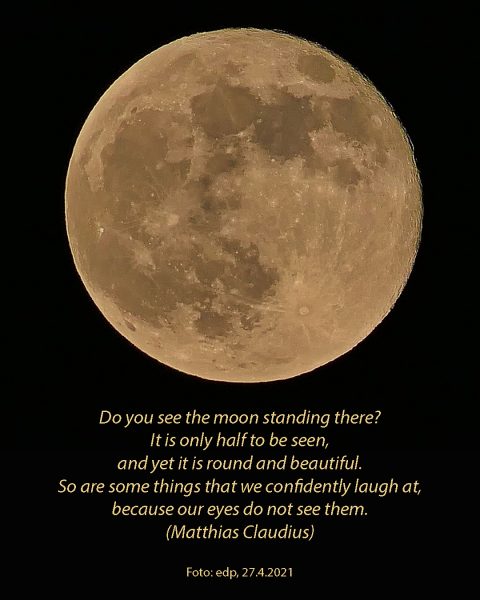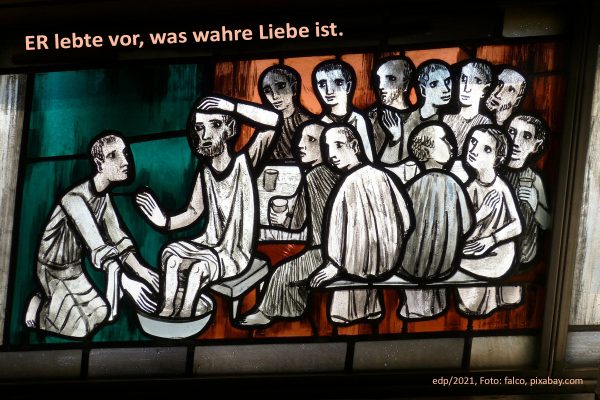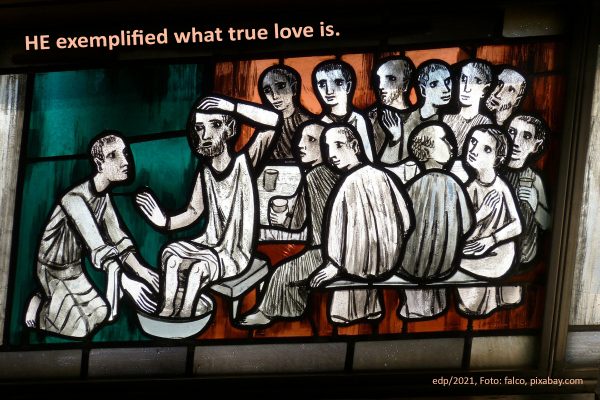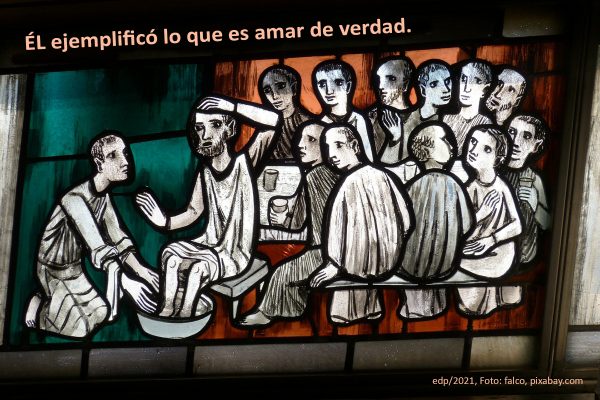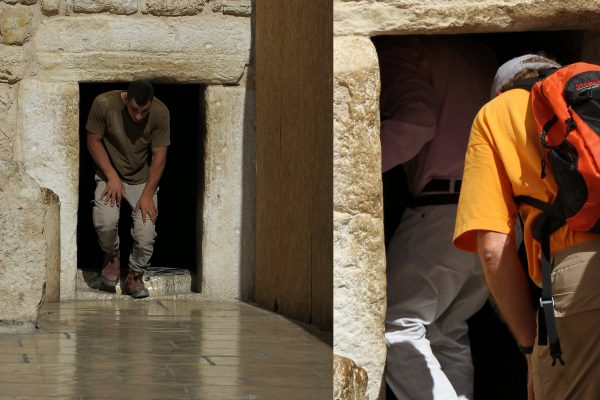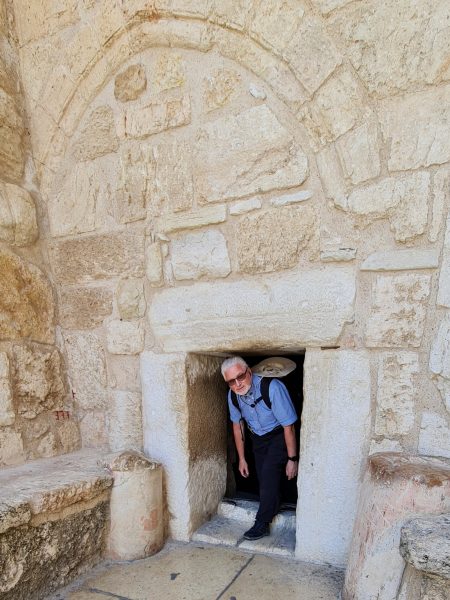
Normalerweise betritt man berühmte Kirchen durch große, prächtig verzierte Portale. Das ist bei der Geburtskirche in Bethlehem nicht der Fall. Von drei Eingängen sind zwei zugemauert und der bis heute genutzte wurde zweimal verkleinert, sodass er heute nur noch bescheidene 1,20 Meter hoch ist. Er erhielt den Beinamen „Demutspforte“. Mehr als zwei Millionen Besucher müssen sich jährlich tief bücken, um den Gebäudekomplex zu betreten.
Angeblich soll das ursprüngliche Spitzbogenportal in osmanischer Zeit verkleinert worden sein, um zu verhindern, dass Eindringlinge zu Pferd die Kirche betraten. Mir gefällt diese Symbolik: Keiner sollte auf dem hohen Ross jenen Ort betreten, wo Gott selbst vom hohen Ross gestiegen ist.
Wie tief der Sohn Gottes herunterstieg, um uns zu erlösen und wieder emporzuheben, beschreibt der Apostel Paulus sehr plastisch in seinem sogenannten Christushymnus (Philipper 2,7-11): Er verzichtete auf seine Vorrechte und erniedrigte sich selbst – bis hin zum Sklavendienst, den er beispielsweise verrichtete, als er seinen Schülern die Füße wusch. Und dann weiter bis zum damals qualvollsten Tod: den Verbrechertod durch Kreuzigung.
Saulus von Tarsus erlebte buchstäblich, wie ihn die Begegnung mit dem Auferstandenen vom hohen Ross hinunterwarf. Aus dem eingebildeten Hassprediger und Christenverfolger wurde Paulus („der Geringe“) der Christenmissionar und Prediger der Freiheit und der Demut. Aus eigener Erfahrung konnte er warnend schreiben: „Seid vorsichtig! Gerade wer meint, er stehe besonders sicher, muss aufpassen, dass er nicht fällt.“ (1. Korinther 10,12 Hfa) Nun bildete er sich nur noch etwas auf Jesus ein: Was ihm früher höchst erstrebenswert war, das hielt er jetzt für Gülle im Vergleich dazu, Christus gewonnen zu haben (vgl. Philipper 3,8).
Weil Paulus diese Umkehrung der Prioritäten selbst erlebt hatte, konnte er den Christen der griechischen Stadt Philippi Folgendes schreiben (Philipper 2,3):
In Demut achte einer den andern höher als sich selbst!
Diese Empfehlung hat an Relevanz nichts verloren. Im Gegenteil: Heute wird die Selbstverwirklichung so betont, dass es nur so an Zeitgenossen wimmelt, die sich für den Nabel der Welt halten, um die sich alles und alle zu drehen hat bzw. haben. Ich empfinde diese Menschen als sehr unangenehm.
Wenn ich manchem dieser arroganten Zeitgenossen begegne, denke ich mir: Den würde ich gern bei der nächsten Kapriole von seinem hohen Ross fallen sehen – je spektakulärer desto besser. Sogleich folgt aber die gedankliche Warnung: Vorsicht, Elí! Das Ross, auf dem du sitzt, ist nicht gerade ein Pony!
- Diese Andacht auf HopeMedia hören (erschienen am 26.7.2022 im Andachtsbuch des Advent-Verlags Lüneburg)
![]()
Get down off your high horse!
Normally, one enters famous churches through large, magnificently decorated portals. This is not the case with the Church of the Nativity in Bethlehem. Of three entrances, two have been bricked up and the one still in use today has been reduced in size twice, so that today it is only a modest 1.20 meters high. It was given the nickname “the gate of humility”. More than two million visitors a year have to stoop low to enter the building complex.
Supposedly, the original pointed arch portal was made smaller in Ottoman times to prevent intruders on horseback from entering the church. I like this symbolism: no one on a high horse should enter that place where God himself descended from his high horse.
How low the Son of God descended in order to redeem us and lift us up again is described very vividly by the apostle Paul in his so-called Christ hymn (Philippians 2:7-11): He renounced his prerogatives and humbled himself – even to the point of slave service, which he performed, for example, when he washed the feet of his disciples. And then further to the most agonizing death at that time: the criminal death by crucifixion.
Saul of Tarsus literally experienced how the encounter with the Risen Lord threw him down from his high horse. The preacher of hate and persecutor of Christians became Paul (“the lowly one”) the Christian missionary and preacher of freedom and humility. From his own experience he could write: “Be careful! The very one who thinks he stands especially secure must be careful not to fall.” (1 Corinthians 10:12) Now he was just imagining things about Jesus: What had once been highly desirable to him, he now considered to be manure compared to having won Christ (cf. Philippians 3:8).
Because Paul had experienced this reversal of priorities himself, he was able to write the following to the Christians of the Greek city of Philippi (Philippians 2:3):
In humility, each esteem other more highly than himself!
This recommendation has lost none of its relevance. On the contrary: Today, self-fulfillment is so emphasized that it is teeming with contemporaries who consider themselves to be the navel of the world, around whom everything and everyone has to revolve. I find these people very unpleasant.
When I meet some of these arrogant contemporaries, I think to myself: I’d like to see him fall off his high horse at the next caper – the more spectacular the better. But immediately follows the mental warning: Be careful, Elí! The horse you’re sitting on is not exactly a pony!
![]()
¡Bájate de tu caballo alto!
Normalmente, se entra en las iglesias famosas a través de grandes portales magníficamente decorados. No es así en la Iglesia de la Natividad de Belén. De las tres entradas, dos han sido tapiadas y la que todavía se utiliza hoy en día ha sido reducida en tamaño dos veces, por lo que hoy sólo tiene una modesta altura de 1,20 metros.
Se la llama la “puerta de la humildad”. Más de dos millones de visitantes al año tienen que agacharse para entrar.
Se supone que el portal original de arco apuntado se hizo más pequeño en la época otomana para evitar que intrusos entraran en la iglesia a caballo. Me gusta este simbolismo: nadie puede entrar “a caballo” en el lugar donde Dios mismo bajó de su alto caballo para pasar a nuestro encuentro.
La profundidad a la que descendió el Hijo de Dios para redimirnos y levantarnos de nuevo lo describe muy vívidamente el apóstol Pablo (Filipenses 2:7-11): renunció a sus prerrogativas y se humilló, hasta el servicio de esclavo, que realizó, por ejemplo, cuando lavó los pies de sus discípulos. Y luego a la muerte más agónica de la época: la muerte destinada a los criminales por crucifixión.
Saulo de Tarso experimentó literalmente cómo el encuentro con el Señor Resucitado lo derribó de su caballo. El predicador del odio y perseguidor de los cristianos se convirtió en Pablo (“el humilde”), el misionero cristiano y predicador de la libertad y la humildad. Por experiencia propia escribió: “¡Cuidado! El que se crea especialmente seguro debe tener cuidado de no caer”. (1 Corintios 10:12) Lo que ahora más le interesaba era Jesús: Lo que antes era lo más valioso para él, ahora lo consideraba estiércol en comparación con haber ganado a Cristo (cf. Filipenses 3:8).
Después de haber experimentado esta inversión de prioridades, pudo escribir lo siguiente a los cristianos de la ciudad griega de Filipos (Filipenses 2:3):
Con humildad cada uno considere a los demás como superiores a sí mismo.
Esta recomendación no ha perdido nada de su relevancia. Por el contrario: hoy en día se hace tanto hincapié en la autorrealización que abundan los contemporáneos que se consideran el ombligo del mundo, en torno al cual tienen que girar todo y todos. Este tipo de personas me resulta muy desagradable.
Cuando me encuentro con algunos de estos arrogantes contemporáneos, pienso: Me gustaría verle caer del caballo en la próxima cabriola; cuanto más espectacular, mejor. Pero inmediatamente me viene la advertencia a la cabeza: ¡Cuidado, Elí! El caballo en el que tú vas sentado es mucho más alto que un poni.



